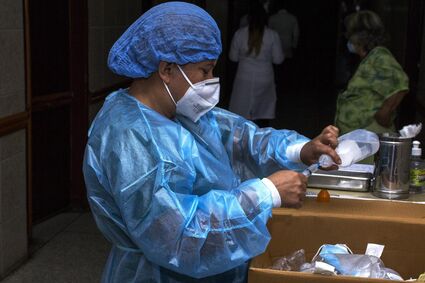Indigenous leaders declare state of emergency over nursing shortage
Last updated 6/23/2022 at 11:07am
BROKENHEAD OJIBWAY NATION, Man.- Cities and rural posts in Manitoba are suffering from a shortage of nurses across the province, and now, First Nation leaders in northern Manitoba have declared a state of emergency.
The Keewatinohk Inniniw Okimowin Council, made up of chiefs and councillors from the 23 First Nations represented by Manitoba Keewatinowi Okimakanak, made this declaration in late May.
"It has always been critical, there's always been a crisis, but it's only been amplified because of the pandemic," said MKO Grand Chief Garrison Settee.
The critical nursing shortage affects all of Manitoba's federal nursing stations, "placing First Nations people in actual peril because of the much longer wait times to be seen in the nursing stations where a minimum standard of care is already stretched to breaking."
There are 22 federally run nursing stations in remote First Nations communities in Manitoba.
Due to the number of nurses available, an "open to emergencies only" policy was put in place for at least the week in May, meaning that the stations can only provide care in emergencies.
"We need to sit down with the governments, we need to sit down with the decision makers and say there is a problem here. People are going to die if we don't do something and something must be done immediately," said Settee.
Pimicikamak Cree Nation Chief David Monias is also calling for meetings with federal and provincial ministers, including Manitoba officials involved with the health-care system transformation that started in 2017. He points out that First Nations residents who are turned away from receving health care because of the emergency-only status feel they're not being considered important enough to be seen by a medical professional.
Part of the challenge in the northern, remote area of Manitoba is that people already have to travel far to receive medical aid. Now there will be even fewer services in the areas to which they travel. And sometimes those delays can mean life or death.
Also a concern is how the overload on medical personnel could affect diagnoses. "Our nursing station has a certain number of FTE nurses allocated, but we never hit that number," says Councillor Shirley Robinson, Pimicikamak. "They sometimes work from 8:00 am in the morning to 4:00 am the next morning. This is very concerning. We would not want a nurse who did double time to assess patients. There could be misdiagnosis and medication errors. These issues place lives at risk".
A spokesperson for Indigenous Services Canada told CBC News reporters that access to health care is still available in Manitoba First Nations communities. "While there are nursing shortages in ISC's nursing stations in isolated and remote First Nations communities, ISC continues to offer regular health care services to communities and is committed to ensuring access to safe care as a priority for all First Nation people."
A spokesperson for the Manitoba government also told CBC reporters that Health Minister Audrey Gordon recently met with officials from the Northern Health Region as well as service providers to find ways to keep nursing stations open.
Still Settee and the MKO say the solution is for First Nations to take over more health care services themselves, so that procedures and diagnostics can be provided in communities.

Pixabay/Rafael Urdaneta Rojas
The lack of medical personnel in northern Manitoba have led First Nations leaders to declare a state of emergency.
First Nations leaders say that the First Nations may be better able to recruit and retain nurses directly, without involvement from other levels of government.
The MKO is requesting a roundtable discussion with the federal and provincial governments to address immediate, short term, medium- and long-term solutions for issues such as but not limited to:
• Long standing shortages of nurses and physicians for northern First Nations, ambulatory and medical transportation related issues, and a lack of preventative health care
• Health infrastructure on reserves which is long overdue for modernization
Modernization of the 1964 Agreement
• Improving the federal and provincial integrated response system for urgent and emergent crises
• Systemic racism







